高中英语定语从句课件(共144张ppt)
图片预览

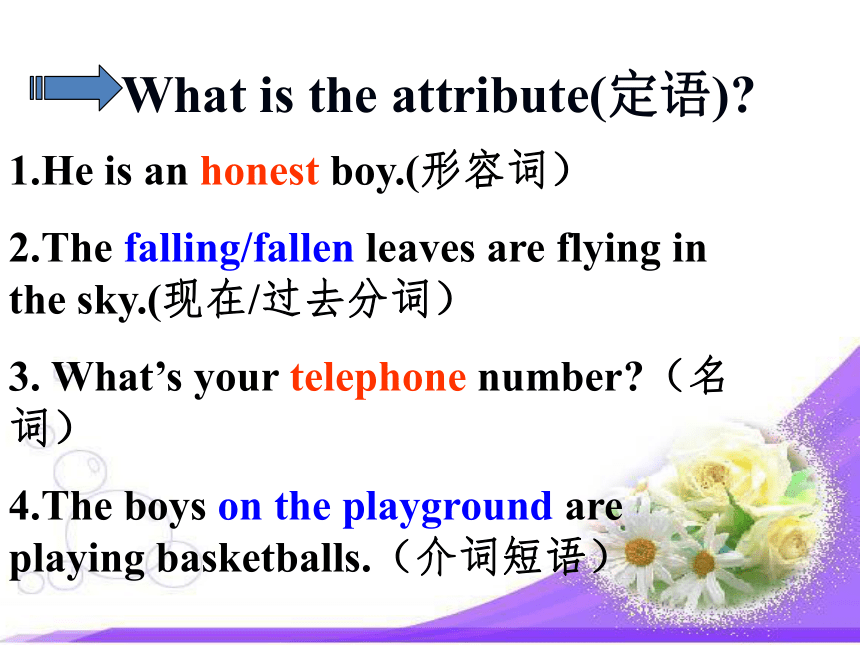
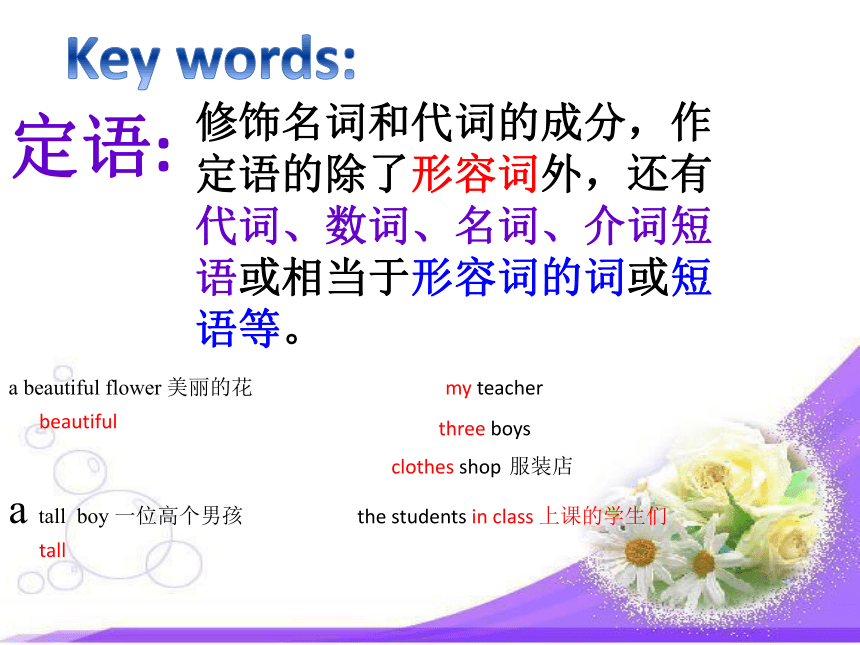
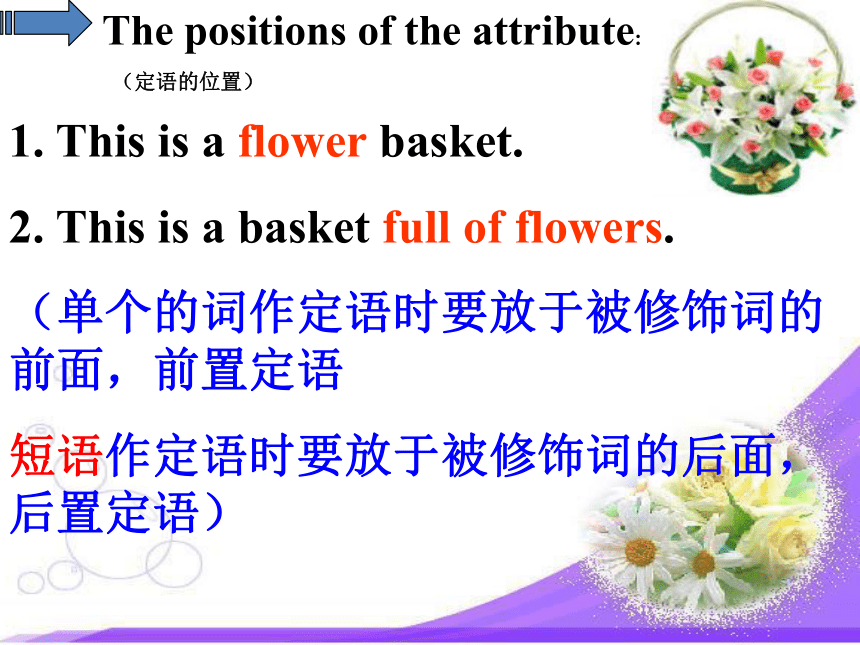
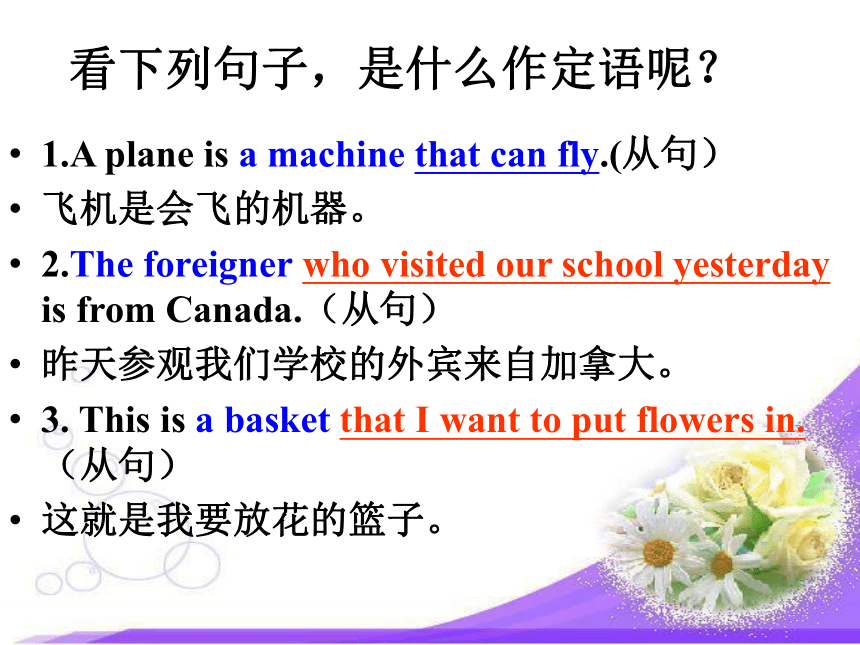

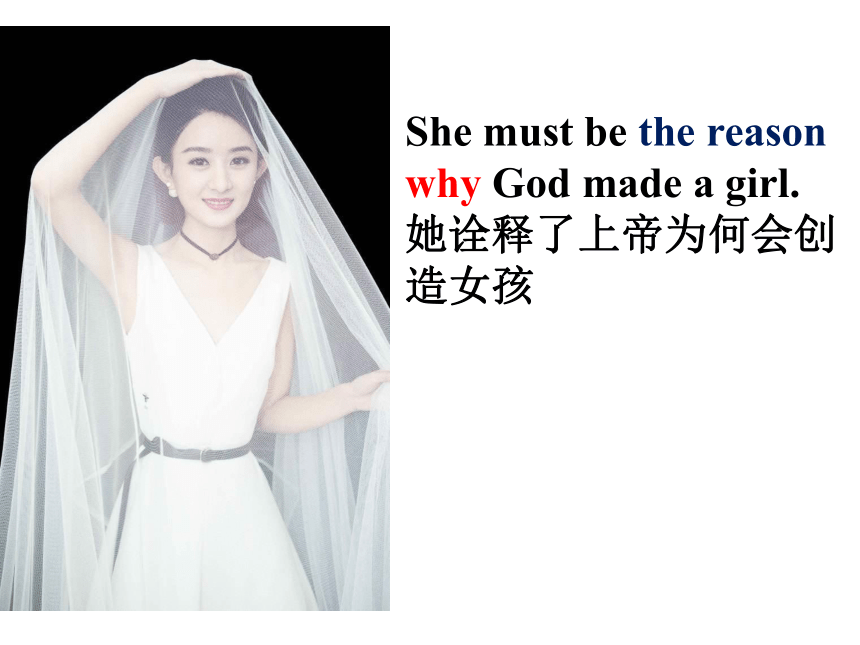

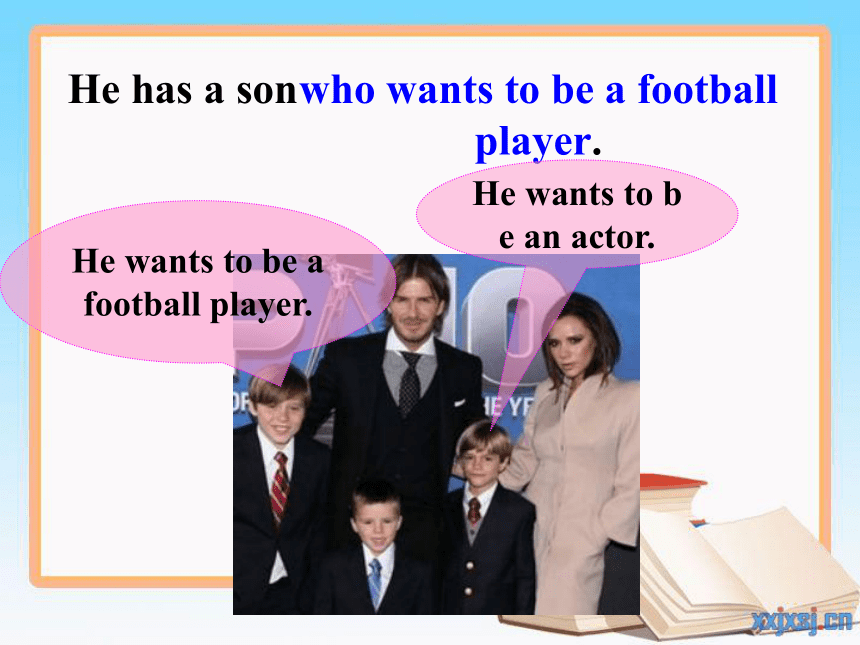
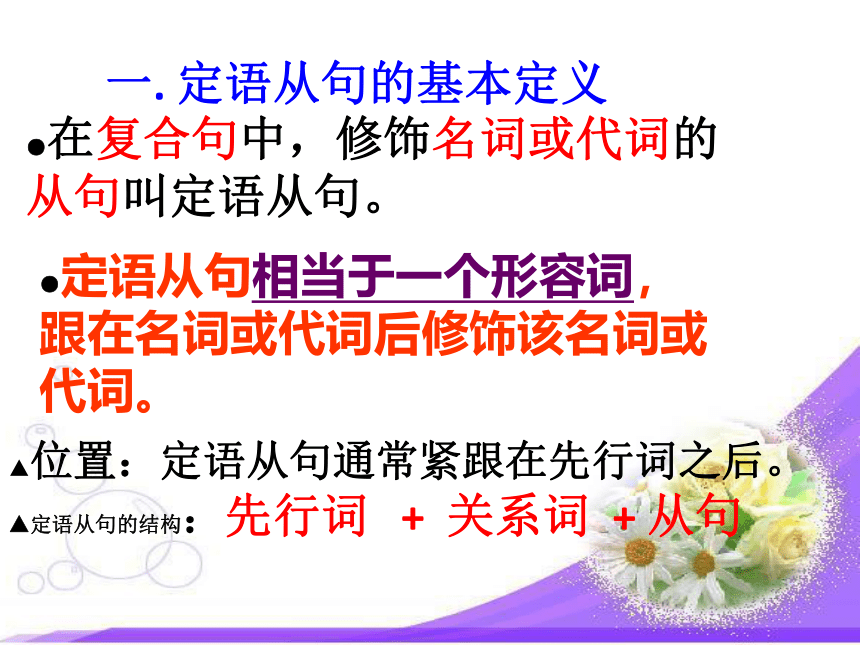
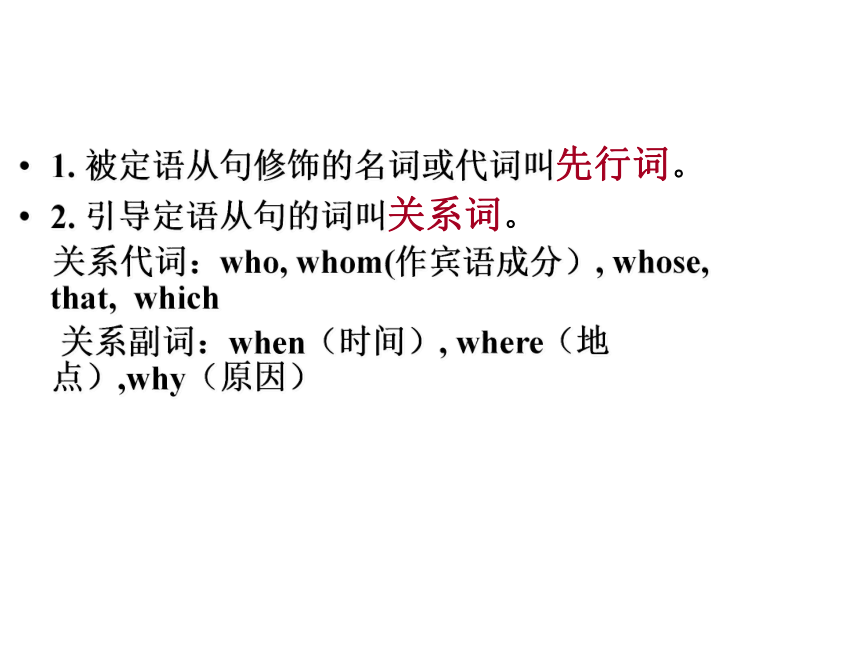
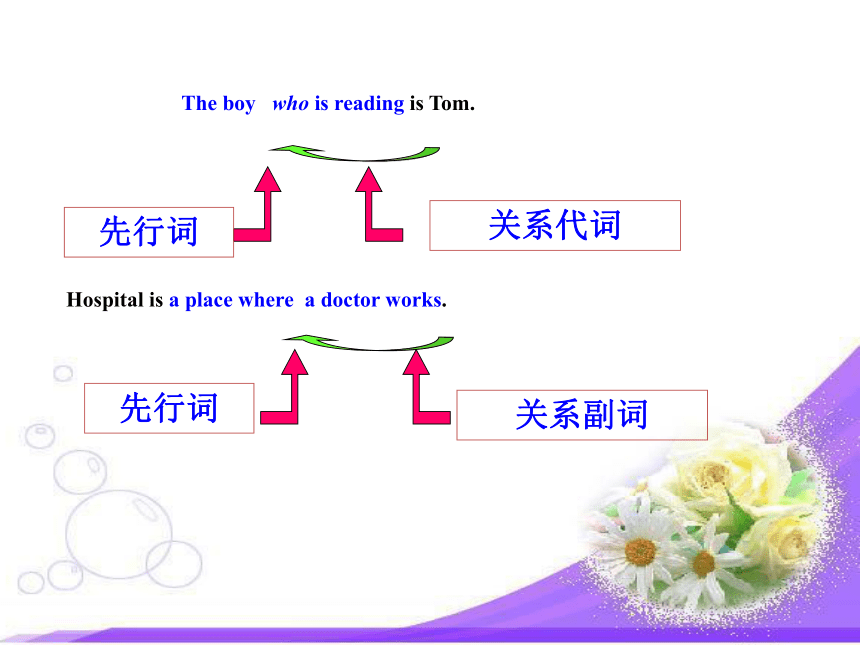
文档简介
(共144张PPT)
The
Attributive
Clause
定语从句
What
is
the
attribute(定语)?
1.He
is
an
honest
boy.(形容词)
2.The
falling/fallen
leaves
are
flying
in
the
sky.(现在/过去分词)
3.
What’s
your
telephone
number?(名词)
4.The
boys
on
the
playground
are
playing
basketballs.(介词短语)
修饰名词和代词的成分,作定语的除了形容词外,还有代词、数词、名词、介词短语或相当于形容词的词或短语等。
Key
words:
定语:
a
beautiful
flower
美丽的花
a
tall
boy
一位高个男孩
beautiful
tall
my
teacher
three
boys
clothes
shop
服装店
the
students
in
class
上课的学生们
The
positions
of
the
attribute:
(定语的位置)
1.
This
is
a
flower
basket.
2.
This
is
a
basket
full
of
flowers.
(单个的词作定语时要放于被修饰词的前面,前置定语
短语作定语时要放于被修饰词的后面,后置定语)
看下列句子,是什么作定语呢?
1.A
plane
is
a
machine
that
can
fly.(从句)
飞机是会飞的机器。
2.The
foreigner
who
visited
our
school
yesterday
is
from
Canada.(从句)
昨天参观我们学校的外宾来自加拿大。
3.
This
is
a
basket
that
I
want
to
put
flowers
in.(从句)
这就是我要放花的篮子。
She
is
the
one
that
you
never
forget.
她就是你念念不忘的那个女孩呀
She
must
be
the
reason
why
God
made
a
girl.
她诠释了上帝为何会创造女孩
She
wins
in
everything
that
she
might
do.
她在她能做的
一切事情上力争成功
He
has
a
son
who
wants
to
be
a
football
player.
He
wants
to
be
a
football
player.
He
wants
to
be
an
actor.
一.
定语从句的基本定义
●在复合句中,修饰名词或代词的从句叫定语从句。
●定语从句相当于一个形容词,跟在名词或代词后修饰该名词或代词。
一.
定语从句的基本定义
▲位置:定语从句通常紧跟在先行词之后。
▲定语从句的结构:先行词
+
关系词
+
从句
1.
被定语从句修饰的名词或代词叫先行词。
2.
引导定语从句的词叫关系词。
关系代词:who,
whom(作宾语成分),
whose,
that,
which
关系副词:when(时间),
where(地点),why(原因)
The
boy
who
is
reading
is
Tom.
先行词
关系代词
Hospital
is
a
place
where
a
doctor
works.
先行词
关系副词
.
定语--从--句
修饰名词或代词的
名词\代词
关系词
具备有句子的基本成分
先行词
关系词的作用
1.
连接先行词与从句;
2.
替代先行词在从句中的位置;
3.
充当从句的成分
指代
所做分
是否可省略
that
人;物
主语;宾语
作宾语可省
which
物
主语;宾语
作宾语可省
who
人
主语;宾语
作宾语可省
whom
人
宾语
可省
whose
人;物
定语
不可省
关系代词的用法
关系副词的用法
指代
所做成分
是否可省略
when
时间
状语
否
where
地点
状语
否
why
原因
状语
否
三.
关系代词的基本用法和注意点
三.
1.
关系代词的基本用法
先行词
在定从中作主语
在定从中作宾语
在定从中作定语
人
who、that
(who、that、whom)
whose
物
which、that
(which、that)
whose
还有as
关系词及其意义
指代人
指代事物
所属关系
指地点
指时间
指原因
who,
whom,
that,
as
which,
that,
as
whose
where(=介词+which)
when
(=介词+which)
why
(=for+which)
关系代词
关系副词
归纳总结
关系代词
关系副词
起连词作用,本身又作从句中的主语、宾语、表语或定语
即起连接作用,本身又在从句中作时间、地点或原因状语
who,whom(…的人)
whose(某人的…)
which(…东西,指物)
that(…的人或物,指物或人)
as(象…那样的,和…相同,正如)
when(…的时候,修饰的时间名词)
where(…的地方修饰场所、方位等名词)
why(…原因;…理由)
20
的定语从句
that,
which,
who,
whom,
whose
1)This
is
the
factory
that
produces
cars.
(作主语,指物)
2)The
girl
that
spoke
to
me
just
now
is
my
classmate.
(作主语,指人)
3)The
film
(that)
we
saw
yesterday
is
interesting.
(作宾语,指物)
that既可指人也可指物,在定语从句中作主语、宾语或表语,作宾语时常可省略。
The
girl
who/that
is
sitting
in
the
chair
is
a
good
singer.
I
got
the
news
that
(which)
made
me
angry
yesterday.
The
man
who/
that
is
speaking
atthe
meeting
is
a
worker.
The
woman
(whom/
that)
they
wanted
to
visit
is
a
teacher.
Where
is
the
boy
who/
that
broke
the
window?
Luckily
none
of
the
people
whom/
that
I
know
were
killed
in
the
earthquake.
The
skirt
which
/
that
Mary
bought
two
years
ago
is
old.
Is
this
the
novel
that
/
which
you
introduced
to
me?
which,
关系代词,
指物,
在从句中作主语或宾语,作宾语时可省.
Football
is
a
game
that/
which
is
liked
by
most
boys.
The
film
that/
which
they
went
to
see
last
night
was
not
interesting
at
all.
26
This
is
the
boy.
He
plays
basketball
very
well.
2.
This
is
the
boy
.
He
often
asks
me
questions.
This
is
the
boy
who
often
asks
me
questions.
This
is
the
boy
who
plays
basketball
very
well.
who
关系代词,
指人,
在从句中作主语.
27
1.
This
is
the
boy.
I
often
help
him.
This
is
the
boy
(whom)
I
often
help.
2.
The
man
is
our
headmaster.
You
met
him
just
now.
The
man
is
our
headmaster
(whom)
you
met
just
now.
whom
关系代词,指人,在从句中作宾语,
可省.
28
Do
you
know
the
girl?
Her
father
is
mayor.
Do
you
know
the
girl
whose
father
is
mayor.
2.
I
used
to
work
in
an
office.
Its
window
faces
north.
I
used
to
work
in
an
office
whose
window
faces
north.
29
3.
I
work
in
a
school.
Its
students
are
excellent.
I
work
in
a
school
whose
students
are
excellent.
whose,
关系代词,
指物/
人,
在从句中作定语.
1.
The
student
______father
works
in
the
factory
is
sitting
there.
2.
I
like
the
rooms
______windows
face
south.
3.This
is
the
desk
______legs
were
broken.
whose
whose
whose
Whose在引导定语从句时,用作定语
指人时:=the
+n+of
whom
=of
whom
+the+n
指物时:=the+n+of
which
=of
which+the+n
▲关系代词that和which
▲
在定语从句中,that
和
which
常常可以互换,但是下列情况只用关系词that,而不宜用which;当然作宾语时可以省略。
考点1:that
与
which
1.
先行词(从句所修饰的词)被形容词最高级或序数词修饰时,只能用that引导从句.
1)This
is
the
most
interesting
story
(
that
)I
have
ever
heard.
2)The
first
meeting
(that)
we
will
take
part
in
will
be
held
in
the
afternoon.
2.先行词是all,
something,
nothing,
anything,everything,
little,
few,much,
none
,
any,
some等不定代词时,只能用that.
1)
Here
is
something
(
that)
I
will
tell
you.我有事要告诉你。
2)
Not
all
that
glitters(闪烁)
is
gold.发光的并非都是金子。
3)We
haven’t
got
much
(that
)we
can
offer
you.
3.先行词既有人也有物时,只能用that引出从句
1)
I
can
remember
well
the
persons
and
some
pictures
(that)
I
saw.
我清楚地记得我看到的人和照片。
2)
They
talked
about
the
teachers
and
schools
(that)
they
had
visited.
4.先行词被
all
,every,
any,
no,
one
of,
the
only,
the
very,
the
right
,
last,
just
等修饰,用that
1)Are
there
any
questions
that
trouble
you
much?
还有你感到非常麻烦的问题吗?
2)The
only
thing
(that)
she
could
do
was
to
go
to
the
police
for
help.
她唯一能做的就是向警察求助。
5.当主句已有疑问词
who或which时,关系词用that
1)Which
is
the
bike
(that
)
you
lost?
2)Who
is
the
woman
that
was
praised
at
the
meeting?
6.当关系代词在定语从句中作to
be
表语时,先行词无论指人还是物,关系词用that。
1)Tom
isn’t
the
boy
that
he
used
to
be.
汤姆不再是过去的老样子了。
2)Shanghai
is
no
longer
the
city
that
it
used
to
be
上海不再时往昔的上海了。
7.
在there
be结构中,当先行词指物时,关系词用that
There
is
a
book
on
the
desk
(that)
I’m
very
interested
in.
桌子上有本我非常感兴趣的书。
8.句子中含有两个定语从句时,其中一个词已用which,
为了避免重复,一般情况,
另一个宜用
that
They
secretly
built
up
a
small
factory
which
produces
things
that
could
cause
pollution.
他们悄悄建了一个小工厂,生产可能造成污染的产品。
▲宜用which
而不用that的情况:
1.当引导非限制定语从句时。
Football,
which
is
a
very
interesting
game,is
played
all
over
the
world.
足球,一项非常有趣的运动,在全世界得到普及。
2.
当关系代词前有介词时。
This
is
the
house
in
which
he
once
lived.这就是他曾经住过的房子。
3.
当先行词本身是that时。
That
which
you
told
him
about
is
what
we
want
to
know.你告诉他的事情就是我们想知道的。
▲用who,而不用that的情况:
1.先行词是one(s),anyone,
someone,
no
one,
none,
all
,those,
nobody,
anybody等指人的不定代词时,关系词使用who
1)Those
who
want
to
go
to
the
Great
Wall
sign
up
here.
2)One
who
has
nothing
to
fear
oneself
dares
to
tell
the
truth.
3)
All
who
have
studied
this
question
have
come
to
the
same
conclusion.
所有研究这个问题的人都得出了同样的结论。
2.在there
be
句型中,先行词指人,关系词用who
1)There
is
an
old
man
who
wants
to
see
you.
2)There
are
many
young
men
who
are
against
him.
44
when
where
why
关系副词
关系副词引导定语从句时,既引导定语从句,又在定语从句中充当状语,
不能省略。
when
指时间,在从句中作时间状语,它的先行词为time,
day,
morning,
night,
week,
year,
moment,
period,
age等,亦可用“介词+which”替代。
我仍然记得第一次坐飞机旅行的时间。
我们生活在许多事情可以在电脑做的时代。
We
are
living
in
an
age
when
many
things
are
done
on
computer.
I
still
remember
the
time
when
I
first
traveled
by
plane.
46
1.
I’ll
never
forget
the
day.
The
earthquake
happened
on
the
day.
I’ll
never
forget
the
day
when
the
earthquake
happened.
2.
I’ll
never
forget
the
days.
We
studied
together
during
the
days.
I’ll
never
forget
the
days
when
we
studied
together.
where指地点,在从句中作地点状语。它的先行词通常为place,
spot,
street,
house,
room,
city,
town,
country等,亦可用“介词+
which”替代。
Can
you
tell
me
the
company
where
he
works?
你能告诉我他工作的公司吗?
Keep
the
books
in
a
place
where
you
can
find
them
easily.
请把书放在容易找到的地方。
48
1.
This
is
the
village.
I
was
born
in
it.
This
is
the
village
where
I
was
born.
2.
This
is
the
shop.
I
buy
bread
in
it.
This
is
the
shop
where
I
buy
bread.
Attention
where
引导的定语从句还可以修饰表示抽象空间概念的名词,如
case(情况或事例),
point(地步或点),degree(程度),situation(情形或处境),
position(位置),
stage(阶段或场景)…
What
are
some
situations
where
body
language
is
the
only
form
of
communication?
在哪些情形下身体语言是唯一的沟通方式?
why
指原因或理由,它的先行词只有reason,
在定语从句中作原因状语,亦可用“介词for+
which”替代。
Can
you
tell
me
the
reason
why
you
didn’t
come
to
his
birthday
party?
你能告诉我你没参加他的生日宴会的原因吗?
51
Give
me
one
good
reason.
I
should
help
you
for
the
reason.
Give
me
one
good
reason
why
I
should
help
you.
2.
He
told
me
the
reason.
He
didn’t
come
to
school
for
the
reason.
He
told
me
the
reason
why
he
didn’t
come
to
school.
3.
关系副词when,
where和关系代词that,
which的区分。
同样是修饰一个地点,有时使用where,有时使用that/which;同样是修饰一个时间,有时使用when,
有时使用that/which。这主要看两点:一:先行词在从句中所作成分;二:是定语从句中的谓语动词是否是一个及物动词。
并非先行词是表示时间、地点和原因的词时都用when,
where,
why,若先行词在定语从句中不作状语,而是作主语或宾语,就必须用which或that。
1.
This
is
the
park
(that
)we
visited
last
year.
This
is
the
park
where
we
held
a
birthday
party.
2.
She
won’t
forget
the
days
(that
)she
spent
on
the
island.
She
won’t
forget
the
days
when
they
stayed
together.
We
often
think
of
the
days
when
we
worked
together
in
the
countryside.
We
often
think
of
the
days
which
we
spent
together
in
the
countryside.
which在定语从句中作宾语
when在定语从句中作时间状语,相当于
on
the
days。
We
believe
the
reason
that
he
told
us.
The
reason
why/for
which
he
was
absent
yesterday
is
still
unknown.
57
I’ll
never
forget
the
days.
I
spent
the
days
with
some
foreign
students.
I’ll
never
forget
the
days
(which)
I
spent
with
some
foreign
students.
58
1.This
is
the
shop.
It
sells
bread.
This
is
the
shop
which
sells
bread.
2.
This
is
the
farm
.It
keeps
many
cows.
This
is
the
farm
which
keeps
many
cows.
3.
This
is
the
farm.
I
visit
it
every
year.
This
is
the
farm
(which
)I
visit
every
year.
59
The
reason
is
not
true.
He
gave
us
the
reason.
The
reason
(which)
he
gave
us
is
not
true.
归纳:
关系词的选择依据先行词在从句中所作的成分,先行词在从句中作主、定、宾语时,选择关系代词
(who,
whom,
that,
which,
whose);先行词在从句中作状语时,应选择关系副词
(
where
地点状语,when
时间状语,why
原因状语)
。
which
,
that
or
where/when/why
1.
This
is
the
museum
_______
my
mother
worked
10
years
ago.
(worked
in
the
museum
地点状语)
This
is
the
museum
_________
was
built
in
1950.
(the
museum
was
build)
(museum
主语)
where
which
2.
July
1,
1921
was
the
day
________
our
Party
was
founded(成立).
(our
Party
was
founded
on
the
day
作状语)
July
1,
1921
was
the
day
__________
we
will
not
forget.
(we
will
never
forget
the
day作宾语)
when
which
3.
I
remember
the
days
_________
I
lived
in
my
home
town.
(I
lived
in
my
home
town
during
the
days
作状语)
I
remember
the
days
__________
I
spent
with
my
grandpa.
(I
spent
the
days
with
..
the
days作宾语)
when
which
4.
The
house
_______________
we’re
going
to
visit
was
built
a
century
ago.
(visit
the
house)
The
house
_________________
used
to
be
a
temple
is
a
school
now.
(the
house
used
to
be
a
temple)
The
house
_________
he
used
to
live
was
flooded.
(
he
used
to
live
in
the
house)
(which
/
that
)
which
/
that
where
5.A
bookstore
is
a
place_________
you
can
get
books.
(you
can
get
the
books
in
the
place)
A
bookstore
is
a
place
_________
books
are
sold.
(books
are
sold
in
the
place)
A
bookstore
is
a
place
_____________
sell
books.
(the
place
sells
books)
where
which/that
where
6.I
can’t
find
the
card
_______
I
wrote
your
address.
(
I
wrote
your
address
on
the
card)
I
can’t
find
the
card
____
_________
I
wrote
your
address.
7.The
box
__________
he
put
his
photos
is
gone.
(he
put
his
photo
into
the
box)
The
box
_______________
he
is
carrying
is
heavy.
(he
is
carrying
the
box)
where
where
on
which
(that/
which)
way
作先行词时关系词的使用
I
really
don’t
like
the
way
(
that/
in
which
)
he
talks
with
his
parents.
Do
it
the
way
I
showed
you.
先行词
the
way
in
which
that
×
reason
作先行词时关系词的使用
先行词
the
reason
for
which
why
that
I’m
not
clear
about
the
reason
for
which
he
did
it.
I’m
not
clear
about
the
reason
why
he
did
it.
I’m
not
clear
about
the
reason
that
he
did
it.
【特别提示】:关系代词在从句中作主语时,从句的谓语动词的人称和数必须与先行词保持一致。如:
1.Those
who
are
against
the
plan
put
up
your
hands.
2.Tom
is
one
of
the
students
who
were
praised
by
the
teacher
yesterday.
3.Tom
is
the
only
one
of
the
students
who
was
praised
by
the
teacher
yesterday.
He
is
one
of
those
workers
_________
able
to
do
this
job.
A.
who
are
B.
whom
is
C.
who
is
D.
whom
are
He
is
the
only
one
of
those
workers
_________
able
to
do
this
job.
A.
who
are
B.
whom
is
C.
who
is
D.
whom
are
定语从句解题方法:
关系词的选择
1.
先看先行词,确定人或物
2.
分析定语从句中的句子成分
3.
确定关系代词的人称和数
4.
注意that和which的特殊情况
用合适的关系词完成句子:
1.The
boys________
are
playing
football
are
from
Class
One.
2.The
girls
________
the
teacher
often
praises
is
our
monitor.
3.The
man
__________you
met
just
now
is
my
old
friend.
4.
Football
is
a
game________
is
liked
by
most
boys.
5.The
film
_______they
went
to
see
last
night
was
not
interesting
at
all.
who
whom
/who
whom
/who
which/
that
which/that
6.Where
is
the
man
___________
I
saw
this
morning?
7.I
once
lived
in
the
house
_________
roof
has
fallen
in.
8.
The
classroom
_______
door
is
broken
will
soon
be
repaired.
9.I
still
remember
the
day
________
I
first
came
to
this
school.
10.
The
house
________
I
lived
ten
years
ago
has
been
pulled
down.
11.Please
tell
me
the
reason
_________
you
missed
the
plane.
that/whom/who
whose
whose
when
where
why
12.
This
is
the
most
expensive
cell
phone
________
I
have
used.
13.
The
building
_________
stands
near
the
river
is
our
school
.
14.
Is
there
a
shop
around
_________
I
can’t
get
a
park
of
cigarettes?
15.
Mencius
was
a
great
thinker
_______
believed
people
were
more
important
than
rulers.
that
which
where
who
The
attributive
clause
Preposition
+
which/that
介词+关系代词
1.
用法
关系代词在定语从句中作介词宾语时,
从句常常由
“介词+关系代词”引导
2.
结构
先行词是人用
“介词+whom”
先行词是物用
“介词+which”
e.g.
The
school
in
which
he
once
studied
is
very
famous.
The
girl
about
whom
we
are
talking
is
a
doctor.
我们正在谈论的那个女孩是个医生。
他曾经上学的学校非常著名。
知识结构图:
“介词+关系代词”
⑴先行词是
⑵选介词
介词+whom
介词+which
人
物
①介词与先行词的关系
②从句谓语动词或形容
词的固定搭配
③整个句子表达的意义
介词+关系代词
介词+关系代词:
介词的选择
根据先行词来确定介词
He
will
never
forget
the
day
on
which
he
failed
in
the
exam.
on
the
day在那天
1949
was
the
year
in
which
the
P.R.C.
was
founded.
found
in
this
year
2.根据从句的谓语动词或形容词固定搭配确定
He
is
the
person
from
whom
I
learn
a
lot.
learn
from
sb.向某人学习
This
is
the
car
____which
I
paid
100$.
This
is
the
car
____which
I
spent
100$.
This
is
the
car
____which
I
go
to
work
every
day.
This
is
the
car
______
which
I
can’t
go
to
work.
for
on
in
without
This
is
the
car
____which
the
old
man
was
knocked
down.
This
is
the
car
____which
a
boy
threw
a
stone.
This
is
the
car
____which
we
talked
.
This
is
the
car
____which
the
window
was
broken
.
by
at
about
of
Can
you
explain
to
me
how
to
use
these
idioms
with
which
I’m
not
familiar.
be
familiar
with
对…
熟悉
3.
根据整个句子的句意确定介词
Air,
without
which
man
can’t
live,
is
really
important.
…
without
air…
This
is
the
village
in
which
I
stayed
last
night.
I
will
never
forget
the
farm
on
which
I
worked
with
you.
in
the
village在乡村
on
the
farm在农场
The
West
Lake,
for
which
Hangzhou
is
famous,
is
a
beautiful
place.
The
man
with
whom
I
shook
hands
just
now
is
a
teacher.
be
famous
for因…..而闻名
shake
hands
with
sb.与某人握手
The
pen,
with
which
he
is
writing
now,
was
bought
yesterday.
This
is
my
pair
of
glasses,
without
which
I
cannot
see
clearly.
…
with
pen…
…
without
glasses…
介词+关系代词
1.有些含有介词的动词短语一般不拆开,
介词仍放在后面,如:
look
for,
look
after,
look
forward
to,
take
care
of等
e.g.
The
baby
whom
the
nurse
is
looking
after
is
very
healthy.
注意:
2.
“介词+关系代词”前还可有不定代词(some,
any,
none,
all,
both,
neither,
many,
most,
each等),
数词,
百分数,
或形容词最高级修饰。
She
has
two
sons,
both
of
whom
are
doctors.
注意:
3.若先行词为时间名词、地点名词或reason,
“介词+关系代词”可用相关的关系副词when,
where,
why替换
e.g.
Beijing
is
the
city
________________
he
has
lived
many
years.
注意:
in
which
=
(where)
4.
whose引导的定语从句,
关系代词whose可替换为
“the+名词
+
of
+
which/whom”或
“of
which/whom
+
the
+
名词”
e.g.
注意:
I
live
in
the
house
whose
roof
is
red.
=
the
roof
of
which
is
red.
=
of
which
the
roof
is
red.
The
winter
holiday
that
we
have
looked
forward
to
for
a
long
time
is
coming.
This
is
the
watch
which/that
I
am
looking
for.
There
are
40
students
in
our
class,
most
of
whom
are
from
big
cities.
I
have
many
friends,
the
tallest
of
whom
is
Lee.
The
reason
________________
he
was
late
isn’t
clear.
I
remember
the
day
________________
I
go
abroad.
on
which
=
(when)
for
which
=
(why)
I
know
a
boy
whose
father
is
a
doctor.
=
the
father
of
whom
is
a
doctor.
=
of
whom
the
father
is
a
doctor.
The
book
__________
I
heard
was
written
20
years
ago.
The
people
__________
the
man
spoke
weren’t
listening.
The
film
__________
I
fell
asleep
was
very
boring.
of
which
to
whom
in
which
The
pen
__________
she
wrote
that
book
can
now
be
seen
in
a
museum.
The
little
creature
__________
scientists
are
interested
is
known
as
ET.
The
gun
__________
he
was
shot
was
never
found.
with
which
in
which
by
which
根据从句中动词与先行词的逻辑关系
1.
Du
Zhe
is
the
magazine
________
which
I
write
articles.
2.
1949
was
the
year
____
which
the
P.R.C
was
founded.
for
in
3.
Can
you
explain
to
me
how
to
use
these
idioms
______
which
I’m
not
sure.
about
根据从句中动词或形容词的习惯搭配
4.Water
is
very
important
for
us
________
which
we
can’t
live.
5.
The
speed
______
which
you
drive
your
car
mustn’t
too
high.
without
根据整个句子的句意确定介词
at
1.The
man
__________
you
shook
hands
just
now
is
our
headmaster.
2.The
room
__________
my
family
live
used
to
be
a
garage.
with
whom
in
which
3.
Did
you
find
the
pen
_________
I
wrote
just
now?
4.
Did
you
find
the
paper
________
I
wrote
my
letter?
5.
Did
you
find
the
composition
______
I
wrote
just
now?
with
which
on
which
which
1.Do
you
know
who
lives
in
the
building
______
there
is
a
well?
A.in
front
of
it
B.
in
front
of
whose
C.in
front
of
which
D.in
front
which
2.I’ll
never
forget
the
day____I
joined
the
League.
A.on
which
B.in
which
C.which
D.at
which
3.The
woman_____my
brother
spoke
just
now
is
my
teacher.
A.
who
B.to
whom
C.to
who
D
whom
C
A
B
4.Jeanne
was
her
old
friend,____she
borrowed
a
necklace.
A.from
who
B.from
whom
C.to
that
D.to
whom
5.His
glasses,_____he
was
like
a
blind
man,fell
to
the
ground
and
broke
its
leg.
A.which
B.with
which
C.without
which
D.that
6.
She
is
a
teacher
of
much
knowledge,_____much
can
be
learned.
A.who
B.that
C.
from
which
D.from
whom
B
C
D
more
exercise
He
built
a
telescope___he
could
study
the
skies.
A.in
which
B.with
that
C.through
which
D.by
it
Do
you
know
the
reason____he
was
late?
A.that
B.which
C.for
what
D.for
which
I
have
bought
two
ballpens,____writes
well.
A.none
of
which
B.neither
of
which
C.none
of
them
D.neither
of
them
C
D
B
The
Second
World
War_____millions
of
people
were
killed
in
1945.
A.during
which
B.in
that
C.where
D.on
which
China
has
many
rivers,____the
Changjiang
River
is
the
longest.
A.which
B.
in
which
C.among
which
D.
one
of
which
This
is
the
very
knife_____I
used
to
cut
apples
yesterday.
A.that
B.by
which
C.which
D.with
which
A
C
D
1.
(2013?浙江卷)
The
children,
______
had
played
the
whole
day
long,
were
worn
out.
A.
all
of
what
B.
all
of
which
C.
all
of
them
D.
all
of
whom
2.
(2013?重庆卷)
John
invited
about
40
people
to
his
wedding,
most
of
______are
family
members.
A.
them
B.
that
C.
which
D.
whom
D
D
4.
For
many
cities
in
the
world,
there
is
no
room
to
spread
out
further,
____
New
York
is
an
example.
A.
for
which?????
B.
in
which??????
C.
of
which???????
D.
from
which
5.
Please
pass
me
the
dictionary
______
is
black.
A.
B.
which
cover??
C.
of
which
the
cover??
D.
its
cover
3.
(2013?北京卷)
Many
countries
are
now
setting
up
national
parks
______
animals
and
plants
can
be
protected.
A.
when
B.
which
C.
whose
D.
where
=in
which
cover
of
which
??
=
the
cover
of
which
D
C
C
The
farm
we
worked
ten
years
ago
isn’t
what
it
used
to
be.
He
is
the
man
you
can
turn
for
help.
This
is
the
tree
we
used
to
play
games.
on
which
to
whom
under
which
on
the
farm
在农场
turn
to
sb.
for
help
向某人求助
under
the
tree
在树下
非限制定语从句
Non-Defining
Attributive
Clause
I
like
the
girl
who
is
making
a
pose.
修饰限制,译为“的”
I
like
the
girl
,
who
is
making
a
pose.
补充说明,译成并列句
We
all
admire
the
man
who
wears
the
white
suit.
不能去掉
I
admire
the
man
,
who
wears
a
big
smile.
能去掉
This
is
the
best
novel
that
I
have
ever
read.
先行词是名词或代词
The
novel,
which
I
read
last
night,
is
very
interesting.
The
novel
is
very
interesting,
which
made
me
very
glad.
先行项可以是名词或代词,也可以是句子
Xi’an
is
a
very
beautiful
city
(which)
I
visited
last
year.
Xi’an,
which
I
visited
last
year,
is
a
nice
old
city.
关系词不可省略
China,
which
was
founded
in
1949,
is
becoming
more
and
more
powerful.?
2.
He
has
to
work
on
Sundays,
which
he
doesn’t
like.
3.His
mother,
who
loves
him
very
much,
is
strict
with
him.?
4.
Zhang
Jike,
whom
everyone
likes
very
much,
is
one
of
the
best
athletes
in
our
class.
5.
Angles,?whose?native
language?is?German,?can?
read
and
write?in?several?foreign
languages.
6.
The
play
,
whose
style
is
informal,
is
popular
with
the
young
people.
7.
They
went
to
London,
where
they
lived
for
six
months.
8.
He
will
put
off
the
picnic
until
May
1st,
when
he
will
be
free.
9.
Last
summer
I
visited
the
People’s
Great
Hall,
in
which
many
important
meetings
are
held
every
year.?
非限制性定语从句中的关系词
指代人
指代事物
所属关系
指地点
指时间
指原因
who,
whom,
that
which,
that
whose,
of
which
where
when
why
关系代词
关系副词
×
×
非限制性定语从句中的关系词
在非限定性定语从句中,不能用关系副词why和关系代词that。要用for
which代替why.
I
had
told
them
the
reason,
for
which
I
didn’t
attend
the
meeting.?
我已经把理由告诉了他们,为此我没有去开会。
①指代人who,?whom,?
Then?he?met?Mary,who(充当主语)?
invited?him?to?a?party.
Peter,?whom(充当宾语)?you?met?in?
London,?is?now?back?in?Paris.
②which
引导的非限定性定语从句:关系代词which在非限制性定语从句中所指代和修饰的可以是主句中的名词、形容词、短语、其他从句或整个主句。
These?apple?trees,which?I?planted?three?years?ago,have?not?borne?any?fruit.
(指代主句中的名词)
She?is?always?careless,which?we?should?not?be.(指代主句中的形容词)
She?is?an?artist,which?surprised
me
a
lot.
(指代整个句子)
③所属关系whose,?of?which
Charlie
Chaplin,
whose(of
whom)
childhood
was
hard,
began
acting
at
the
age
of
five.
④指地点?where?
They?went?to?London,where(地点状语)?they?lived?for?six?months.
⑤指时间when??
He?will?put?off?the?picnic?until?May?1st,?
when?he?will?be?free.
⑥指原因
for
which
He
was
late
for
class,for
which
he
was
punished
by
his
English
teacher.
⑦“名词/代词+of+which?/?whom”引导的非限制性定语从句??
Light?is?the?fast?thing?in?the?world,?the?
speed?of?which?is?300.000?kilometers?per?
second.
⑧as引导的非限制性定语从句
as引出非限定性定语从句时,代替整个主句,对其进行说明。但通常用于像
as?we?all?know,;as?is?know?to?all,
as?is?said?above;as
is?always?mentioned?
above,?
as?is?usual;as?is?often?the?case,?
as
is
reported
in
the
newspaper
Shakespeare
is
a
famous
writer,as
we
all
know.
众所周知,莎士比亚是一位著名的做偶家。
当与such或the?same连用时,一般用as
Such?books?as?you?tell?me?are?interesting.
I?have?the?same?plan?as?you.
8.Spiders
are
not
insects,
as
many
people
think.
=(As
many
people
think,
spiders
are
not
insects.)
as
(译为
__________)
引导的非限制性定语从句的位置比较灵活,
可位于所修饰的句子之后,
句中或句首;
而由
which
(译为
________________)
引导的非限制性定语从句一般不位于句首。
“正如……”
“这”
或
“这件事”
133
Football,
________
is
a
very
interesting
game,
is
played
all
over
the
world.
My
father,
_______
is
a
physics
teacher,
works
in
this
school.
which
who
The
Differences
限制性定语从句
非限制性定语从句
形式上
意义上
作用上
不用逗号
用逗号
去掉后句意不完整
去掉后,句意完整
修饰限制
只可修饰先行词
补充说明
可修饰先行词或主句
译为“…的”
可译为并列句
翻译时
关系词
作宾语时可以省略
不可省略且不能用
that
,
why
引导
1.
His
movie
won
several
awards
at
the
film
festival,
_____
was
beyond
his
wildest
dream.
(2007上海)
A.
which
B.
that
C.
where
D.
it
2.
She
will
fly
to
Washington,
_________
she
can
enjoy
herself.
A.
where
B.
that
C.
which
D.
/
1.
Charles
Smith
,
_____
was
my
former
teacher,
retired
last
year.
2.
After
the
war
he
went
to
the
America,
_______
he
found
a
job.
3.
He
pretended
not
to
know
me,
______
I
found
quite
strange.
who
which
where
When
引导定语从句与时间状语从句的区分:
When引导定语从句时,从句修饰限定先行词,跟在先行词后面。
When引导时间状语从句时,说明动作发生的时间,可以放在主句之前。
Do
you
know
the
time
when
the
class
is
over?
When
the
class
is
over,
the
light
went
out.
Do
you
know
the
time
when
he
left?
When
he
left
,what
did
you
do
?
时间状语从句
定语从句
时间状语从句
时间状语从句
Where引导定语从句和地点状语从句的区分:
Where引导定语从句是,修饰限定表地点的先行词。
Where引导地点状语从句时,说明动作发生的地点,where之前没有表示地点的名词,而是动词。
A
lot
of
buldings
have
been
built
where
there
used
to
be
a
wasteland.
This
is
the
place
where
we
used
to
live
a
few
years
ago.
地点状语从句
定语从句
That引导定语从句和同为语从句的区分:
That引导定语从句时,that在定语从句中充当主语或宾语,做宾语时可以省略。
That引导同为语从句时,that在从句中不充当任何成分,只起引导作用,that不能省略。
The
news
that
our
team
won
made
me
excited.
The
news(
that)
they
told
me
made
me
excited.
I
don’t
believe
the
news(
that)
he
mentioned
just
now.
I
don’t
believe
the
news
that
he
failed
again.
同位语从句
定语从句
定语从句
同位语从句
巩固练习:
Finally
the
thief
handed
everything
______
he
had
stolen
to
the
police.
Which
B.
what
C.
whatever
D.
that
2.
He
told
me
all
________
he
knew.
which
B.
what
C.
that
D.
how
3.
He
was
very
rude
to
the
Customs
officer,
_____
of
course
made
things
even
worse.
who
B.
whom
C.
what
D.
which
√
√
√
4.
Is
the
river
_____
through
that
town
very
large?
which
flows
B.
flows
C.
that
flowing
D.
whose
flows
5.
The
most
important
thing____
we
should
pay
attention
to
is
the
first
thing
______I
have
said.
A.
which;
that
B.
that;
which
C.
which;
which
D.
that;
that
6.
The
songs
_______
she
sang
in
the
concert
yesterday
sounded
______
A.
/,
beautifully
B.
that
,wonderfully
C.
which
,
well
D./,
nice
√
√
√
7.
The
result
of
the
experiment
was
very
good,
_____we
hadn’t
expected.
A.
when
B.
that
C.
which
D.
what
8.
You
may
keep
any
_____
you
find.
A.that
B.which
C.what
D.whom
9.
In
the
dark
street,
there
wasn’t
a
single
person______
she
could
turn
for
help.
to
whom
B.
who
C.
from
whom
D.
that
10.
The
Great
Wall
is
the
last
place
____Mr.
smith
is
going
to
visit
before
he
leaves
Beijing.
A.
where
B.
which
C.
/
D.
what
√
√
√
√
11.They
study
in
a
small
classroom
_____
floor
is
broken.
A.whose
B.which
C.where
D.that
12.
Next
Sunday
is
the
only
day
_____
he
can
spare
to
join
us.
A.that
B.which
C.when
D.on
which
13.
He
isn't
the
man
_____
he
used
to
be.
A.that
B.whom
C.who
D.which
14.
Please
pass
me
the
dictionary
_____
cover
is
black.
A.which
B.which
of
C.its
D.whose
√
√
√
√
15.Through
practice
we
can
learn
a
lot
_____
can
not_____
from
books.
A.which;be
learned
B.that;learn
C.which;learn
D.that;be
learned
√
The
Attributive
Clause
定语从句
What
is
the
attribute(定语)?
1.He
is
an
honest
boy.(形容词)
2.The
falling/fallen
leaves
are
flying
in
the
sky.(现在/过去分词)
3.
What’s
your
telephone
number?(名词)
4.The
boys
on
the
playground
are
playing
basketballs.(介词短语)
修饰名词和代词的成分,作定语的除了形容词外,还有代词、数词、名词、介词短语或相当于形容词的词或短语等。
Key
words:
定语:
a
beautiful
flower
美丽的花
a
tall
boy
一位高个男孩
beautiful
tall
my
teacher
three
boys
clothes
shop
服装店
the
students
in
class
上课的学生们
The
positions
of
the
attribute:
(定语的位置)
1.
This
is
a
flower
basket.
2.
This
is
a
basket
full
of
flowers.
(单个的词作定语时要放于被修饰词的前面,前置定语
短语作定语时要放于被修饰词的后面,后置定语)
看下列句子,是什么作定语呢?
1.A
plane
is
a
machine
that
can
fly.(从句)
飞机是会飞的机器。
2.The
foreigner
who
visited
our
school
yesterday
is
from
Canada.(从句)
昨天参观我们学校的外宾来自加拿大。
3.
This
is
a
basket
that
I
want
to
put
flowers
in.(从句)
这就是我要放花的篮子。
She
is
the
one
that
you
never
forget.
她就是你念念不忘的那个女孩呀
She
must
be
the
reason
why
God
made
a
girl.
她诠释了上帝为何会创造女孩
She
wins
in
everything
that
she
might
do.
她在她能做的
一切事情上力争成功
He
has
a
son
who
wants
to
be
a
football
player.
He
wants
to
be
a
football
player.
He
wants
to
be
an
actor.
一.
定语从句的基本定义
●在复合句中,修饰名词或代词的从句叫定语从句。
●定语从句相当于一个形容词,跟在名词或代词后修饰该名词或代词。
一.
定语从句的基本定义
▲位置:定语从句通常紧跟在先行词之后。
▲定语从句的结构:先行词
+
关系词
+
从句
1.
被定语从句修饰的名词或代词叫先行词。
2.
引导定语从句的词叫关系词。
关系代词:who,
whom(作宾语成分),
whose,
that,
which
关系副词:when(时间),
where(地点),why(原因)
The
boy
who
is
reading
is
Tom.
先行词
关系代词
Hospital
is
a
place
where
a
doctor
works.
先行词
关系副词
.
定语--从--句
修饰名词或代词的
名词\代词
关系词
具备有句子的基本成分
先行词
关系词的作用
1.
连接先行词与从句;
2.
替代先行词在从句中的位置;
3.
充当从句的成分
指代
所做分
是否可省略
that
人;物
主语;宾语
作宾语可省
which
物
主语;宾语
作宾语可省
who
人
主语;宾语
作宾语可省
whom
人
宾语
可省
whose
人;物
定语
不可省
关系代词的用法
关系副词的用法
指代
所做成分
是否可省略
when
时间
状语
否
where
地点
状语
否
why
原因
状语
否
三.
关系代词的基本用法和注意点
三.
1.
关系代词的基本用法
先行词
在定从中作主语
在定从中作宾语
在定从中作定语
人
who、that
(who、that、whom)
whose
物
which、that
(which、that)
whose
还有as
关系词及其意义
指代人
指代事物
所属关系
指地点
指时间
指原因
who,
whom,
that,
as
which,
that,
as
whose
where(=介词+which)
when
(=介词+which)
why
(=for+which)
关系代词
关系副词
归纳总结
关系代词
关系副词
起连词作用,本身又作从句中的主语、宾语、表语或定语
即起连接作用,本身又在从句中作时间、地点或原因状语
who,whom(…的人)
whose(某人的…)
which(…东西,指物)
that(…的人或物,指物或人)
as(象…那样的,和…相同,正如)
when(…的时候,修饰的时间名词)
where(…的地方修饰场所、方位等名词)
why(…原因;…理由)
20
的定语从句
that,
which,
who,
whom,
whose
1)This
is
the
factory
that
produces
cars.
(作主语,指物)
2)The
girl
that
spoke
to
me
just
now
is
my
classmate.
(作主语,指人)
3)The
film
(that)
we
saw
yesterday
is
interesting.
(作宾语,指物)
that既可指人也可指物,在定语从句中作主语、宾语或表语,作宾语时常可省略。
The
girl
who/that
is
sitting
in
the
chair
is
a
good
singer.
I
got
the
news
that
(which)
made
me
angry
yesterday.
The
man
who/
that
is
speaking
atthe
meeting
is
a
worker.
The
woman
(whom/
that)
they
wanted
to
visit
is
a
teacher.
Where
is
the
boy
who/
that
broke
the
window?
Luckily
none
of
the
people
whom/
that
I
know
were
killed
in
the
earthquake.
The
skirt
which
/
that
Mary
bought
two
years
ago
is
old.
Is
this
the
novel
that
/
which
you
introduced
to
me?
which,
关系代词,
指物,
在从句中作主语或宾语,作宾语时可省.
Football
is
a
game
that/
which
is
liked
by
most
boys.
The
film
that/
which
they
went
to
see
last
night
was
not
interesting
at
all.
26
This
is
the
boy.
He
plays
basketball
very
well.
2.
This
is
the
boy
.
He
often
asks
me
questions.
This
is
the
boy
who
often
asks
me
questions.
This
is
the
boy
who
plays
basketball
very
well.
who
关系代词,
指人,
在从句中作主语.
27
1.
This
is
the
boy.
I
often
help
him.
This
is
the
boy
(whom)
I
often
help.
2.
The
man
is
our
headmaster.
You
met
him
just
now.
The
man
is
our
headmaster
(whom)
you
met
just
now.
whom
关系代词,指人,在从句中作宾语,
可省.
28
Do
you
know
the
girl?
Her
father
is
mayor.
Do
you
know
the
girl
whose
father
is
mayor.
2.
I
used
to
work
in
an
office.
Its
window
faces
north.
I
used
to
work
in
an
office
whose
window
faces
north.
29
3.
I
work
in
a
school.
Its
students
are
excellent.
I
work
in
a
school
whose
students
are
excellent.
whose,
关系代词,
指物/
人,
在从句中作定语.
1.
The
student
______father
works
in
the
factory
is
sitting
there.
2.
I
like
the
rooms
______windows
face
south.
3.This
is
the
desk
______legs
were
broken.
whose
whose
whose
Whose在引导定语从句时,用作定语
指人时:=the
+n+of
whom
=of
whom
+the+n
指物时:=the+n+of
which
=of
which+the+n
▲关系代词that和which
▲
在定语从句中,that
和
which
常常可以互换,但是下列情况只用关系词that,而不宜用which;当然作宾语时可以省略。
考点1:that
与
which
1.
先行词(从句所修饰的词)被形容词最高级或序数词修饰时,只能用that引导从句.
1)This
is
the
most
interesting
story
(
that
)I
have
ever
heard.
2)The
first
meeting
(that)
we
will
take
part
in
will
be
held
in
the
afternoon.
2.先行词是all,
something,
nothing,
anything,everything,
little,
few,much,
none
,
any,
some等不定代词时,只能用that.
1)
Here
is
something
(
that)
I
will
tell
you.我有事要告诉你。
2)
Not
all
that
glitters(闪烁)
is
gold.发光的并非都是金子。
3)We
haven’t
got
much
(that
)we
can
offer
you.
3.先行词既有人也有物时,只能用that引出从句
1)
I
can
remember
well
the
persons
and
some
pictures
(that)
I
saw.
我清楚地记得我看到的人和照片。
2)
They
talked
about
the
teachers
and
schools
(that)
they
had
visited.
4.先行词被
all
,every,
any,
no,
one
of,
the
only,
the
very,
the
right
,
last,
just
等修饰,用that
1)Are
there
any
questions
that
trouble
you
much?
还有你感到非常麻烦的问题吗?
2)The
only
thing
(that)
she
could
do
was
to
go
to
the
police
for
help.
她唯一能做的就是向警察求助。
5.当主句已有疑问词
who或which时,关系词用that
1)Which
is
the
bike
(that
)
you
lost?
2)Who
is
the
woman
that
was
praised
at
the
meeting?
6.当关系代词在定语从句中作to
be
表语时,先行词无论指人还是物,关系词用that。
1)Tom
isn’t
the
boy
that
he
used
to
be.
汤姆不再是过去的老样子了。
2)Shanghai
is
no
longer
the
city
that
it
used
to
be
上海不再时往昔的上海了。
7.
在there
be结构中,当先行词指物时,关系词用that
There
is
a
book
on
the
desk
(that)
I’m
very
interested
in.
桌子上有本我非常感兴趣的书。
8.句子中含有两个定语从句时,其中一个词已用which,
为了避免重复,一般情况,
另一个宜用
that
They
secretly
built
up
a
small
factory
which
produces
things
that
could
cause
pollution.
他们悄悄建了一个小工厂,生产可能造成污染的产品。
▲宜用which
而不用that的情况:
1.当引导非限制定语从句时。
Football,
which
is
a
very
interesting
game,is
played
all
over
the
world.
足球,一项非常有趣的运动,在全世界得到普及。
2.
当关系代词前有介词时。
This
is
the
house
in
which
he
once
lived.这就是他曾经住过的房子。
3.
当先行词本身是that时。
That
which
you
told
him
about
is
what
we
want
to
know.你告诉他的事情就是我们想知道的。
▲用who,而不用that的情况:
1.先行词是one(s),anyone,
someone,
no
one,
none,
all
,those,
nobody,
anybody等指人的不定代词时,关系词使用who
1)Those
who
want
to
go
to
the
Great
Wall
sign
up
here.
2)One
who
has
nothing
to
fear
oneself
dares
to
tell
the
truth.
3)
All
who
have
studied
this
question
have
come
to
the
same
conclusion.
所有研究这个问题的人都得出了同样的结论。
2.在there
be
句型中,先行词指人,关系词用who
1)There
is
an
old
man
who
wants
to
see
you.
2)There
are
many
young
men
who
are
against
him.
44
when
where
why
关系副词
关系副词引导定语从句时,既引导定语从句,又在定语从句中充当状语,
不能省略。
when
指时间,在从句中作时间状语,它的先行词为time,
day,
morning,
night,
week,
year,
moment,
period,
age等,亦可用“介词+which”替代。
我仍然记得第一次坐飞机旅行的时间。
我们生活在许多事情可以在电脑做的时代。
We
are
living
in
an
age
when
many
things
are
done
on
computer.
I
still
remember
the
time
when
I
first
traveled
by
plane.
46
1.
I’ll
never
forget
the
day.
The
earthquake
happened
on
the
day.
I’ll
never
forget
the
day
when
the
earthquake
happened.
2.
I’ll
never
forget
the
days.
We
studied
together
during
the
days.
I’ll
never
forget
the
days
when
we
studied
together.
where指地点,在从句中作地点状语。它的先行词通常为place,
spot,
street,
house,
room,
city,
town,
country等,亦可用“介词+
which”替代。
Can
you
tell
me
the
company
where
he
works?
你能告诉我他工作的公司吗?
Keep
the
books
in
a
place
where
you
can
find
them
easily.
请把书放在容易找到的地方。
48
1.
This
is
the
village.
I
was
born
in
it.
This
is
the
village
where
I
was
born.
2.
This
is
the
shop.
I
buy
bread
in
it.
This
is
the
shop
where
I
buy
bread.
Attention
where
引导的定语从句还可以修饰表示抽象空间概念的名词,如
case(情况或事例),
point(地步或点),degree(程度),situation(情形或处境),
position(位置),
stage(阶段或场景)…
What
are
some
situations
where
body
language
is
the
only
form
of
communication?
在哪些情形下身体语言是唯一的沟通方式?
why
指原因或理由,它的先行词只有reason,
在定语从句中作原因状语,亦可用“介词for+
which”替代。
Can
you
tell
me
the
reason
why
you
didn’t
come
to
his
birthday
party?
你能告诉我你没参加他的生日宴会的原因吗?
51
Give
me
one
good
reason.
I
should
help
you
for
the
reason.
Give
me
one
good
reason
why
I
should
help
you.
2.
He
told
me
the
reason.
He
didn’t
come
to
school
for
the
reason.
He
told
me
the
reason
why
he
didn’t
come
to
school.
3.
关系副词when,
where和关系代词that,
which的区分。
同样是修饰一个地点,有时使用where,有时使用that/which;同样是修饰一个时间,有时使用when,
有时使用that/which。这主要看两点:一:先行词在从句中所作成分;二:是定语从句中的谓语动词是否是一个及物动词。
并非先行词是表示时间、地点和原因的词时都用when,
where,
why,若先行词在定语从句中不作状语,而是作主语或宾语,就必须用which或that。
1.
This
is
the
park
(that
)we
visited
last
year.
This
is
the
park
where
we
held
a
birthday
party.
2.
She
won’t
forget
the
days
(that
)she
spent
on
the
island.
She
won’t
forget
the
days
when
they
stayed
together.
We
often
think
of
the
days
when
we
worked
together
in
the
countryside.
We
often
think
of
the
days
which
we
spent
together
in
the
countryside.
which在定语从句中作宾语
when在定语从句中作时间状语,相当于
on
the
days。
We
believe
the
reason
that
he
told
us.
The
reason
why/for
which
he
was
absent
yesterday
is
still
unknown.
57
I’ll
never
forget
the
days.
I
spent
the
days
with
some
foreign
students.
I’ll
never
forget
the
days
(which)
I
spent
with
some
foreign
students.
58
1.This
is
the
shop.
It
sells
bread.
This
is
the
shop
which
sells
bread.
2.
This
is
the
farm
.It
keeps
many
cows.
This
is
the
farm
which
keeps
many
cows.
3.
This
is
the
farm.
I
visit
it
every
year.
This
is
the
farm
(which
)I
visit
every
year.
59
The
reason
is
not
true.
He
gave
us
the
reason.
The
reason
(which)
he
gave
us
is
not
true.
归纳:
关系词的选择依据先行词在从句中所作的成分,先行词在从句中作主、定、宾语时,选择关系代词
(who,
whom,
that,
which,
whose);先行词在从句中作状语时,应选择关系副词
(
where
地点状语,when
时间状语,why
原因状语)
。
which
,
that
or
where/when/why
1.
This
is
the
museum
_______
my
mother
worked
10
years
ago.
(worked
in
the
museum
地点状语)
This
is
the
museum
_________
was
built
in
1950.
(the
museum
was
build)
(museum
主语)
where
which
2.
July
1,
1921
was
the
day
________
our
Party
was
founded(成立).
(our
Party
was
founded
on
the
day
作状语)
July
1,
1921
was
the
day
__________
we
will
not
forget.
(we
will
never
forget
the
day作宾语)
when
which
3.
I
remember
the
days
_________
I
lived
in
my
home
town.
(I
lived
in
my
home
town
during
the
days
作状语)
I
remember
the
days
__________
I
spent
with
my
grandpa.
(I
spent
the
days
with
..
the
days作宾语)
when
which
4.
The
house
_______________
we’re
going
to
visit
was
built
a
century
ago.
(visit
the
house)
The
house
_________________
used
to
be
a
temple
is
a
school
now.
(the
house
used
to
be
a
temple)
The
house
_________
he
used
to
live
was
flooded.
(
he
used
to
live
in
the
house)
(which
/
that
)
which
/
that
where
5.A
bookstore
is
a
place_________
you
can
get
books.
(you
can
get
the
books
in
the
place)
A
bookstore
is
a
place
_________
books
are
sold.
(books
are
sold
in
the
place)
A
bookstore
is
a
place
_____________
sell
books.
(the
place
sells
books)
where
which/that
where
6.I
can’t
find
the
card
_______
I
wrote
your
address.
(
I
wrote
your
address
on
the
card)
I
can’t
find
the
card
____
_________
I
wrote
your
address.
7.The
box
__________
he
put
his
photos
is
gone.
(he
put
his
photo
into
the
box)
The
box
_______________
he
is
carrying
is
heavy.
(he
is
carrying
the
box)
where
where
on
which
(that/
which)
way
作先行词时关系词的使用
I
really
don’t
like
the
way
(
that/
in
which
)
he
talks
with
his
parents.
Do
it
the
way
I
showed
you.
先行词
the
way
in
which
that
×
reason
作先行词时关系词的使用
先行词
the
reason
for
which
why
that
I’m
not
clear
about
the
reason
for
which
he
did
it.
I’m
not
clear
about
the
reason
why
he
did
it.
I’m
not
clear
about
the
reason
that
he
did
it.
【特别提示】:关系代词在从句中作主语时,从句的谓语动词的人称和数必须与先行词保持一致。如:
1.Those
who
are
against
the
plan
put
up
your
hands.
2.Tom
is
one
of
the
students
who
were
praised
by
the
teacher
yesterday.
3.Tom
is
the
only
one
of
the
students
who
was
praised
by
the
teacher
yesterday.
He
is
one
of
those
workers
_________
able
to
do
this
job.
A.
who
are
B.
whom
is
C.
who
is
D.
whom
are
He
is
the
only
one
of
those
workers
_________
able
to
do
this
job.
A.
who
are
B.
whom
is
C.
who
is
D.
whom
are
定语从句解题方法:
关系词的选择
1.
先看先行词,确定人或物
2.
分析定语从句中的句子成分
3.
确定关系代词的人称和数
4.
注意that和which的特殊情况
用合适的关系词完成句子:
1.The
boys________
are
playing
football
are
from
Class
One.
2.The
girls
________
the
teacher
often
praises
is
our
monitor.
3.The
man
__________you
met
just
now
is
my
old
friend.
4.
Football
is
a
game________
is
liked
by
most
boys.
5.The
film
_______they
went
to
see
last
night
was
not
interesting
at
all.
who
whom
/who
whom
/who
which/
that
which/that
6.Where
is
the
man
___________
I
saw
this
morning?
7.I
once
lived
in
the
house
_________
roof
has
fallen
in.
8.
The
classroom
_______
door
is
broken
will
soon
be
repaired.
9.I
still
remember
the
day
________
I
first
came
to
this
school.
10.
The
house
________
I
lived
ten
years
ago
has
been
pulled
down.
11.Please
tell
me
the
reason
_________
you
missed
the
plane.
that/whom/who
whose
whose
when
where
why
12.
This
is
the
most
expensive
cell
phone
________
I
have
used.
13.
The
building
_________
stands
near
the
river
is
our
school
.
14.
Is
there
a
shop
around
_________
I
can’t
get
a
park
of
cigarettes?
15.
Mencius
was
a
great
thinker
_______
believed
people
were
more
important
than
rulers.
that
which
where
who
The
attributive
clause
Preposition
+
which/that
介词+关系代词
1.
用法
关系代词在定语从句中作介词宾语时,
从句常常由
“介词+关系代词”引导
2.
结构
先行词是人用
“介词+whom”
先行词是物用
“介词+which”
e.g.
The
school
in
which
he
once
studied
is
very
famous.
The
girl
about
whom
we
are
talking
is
a
doctor.
我们正在谈论的那个女孩是个医生。
他曾经上学的学校非常著名。
知识结构图:
“介词+关系代词”
⑴先行词是
⑵选介词
介词+whom
介词+which
人
物
①介词与先行词的关系
②从句谓语动词或形容
词的固定搭配
③整个句子表达的意义
介词+关系代词
介词+关系代词:
介词的选择
根据先行词来确定介词
He
will
never
forget
the
day
on
which
he
failed
in
the
exam.
on
the
day在那天
1949
was
the
year
in
which
the
P.R.C.
was
founded.
found
in
this
year
2.根据从句的谓语动词或形容词固定搭配确定
He
is
the
person
from
whom
I
learn
a
lot.
learn
from
sb.向某人学习
This
is
the
car
____which
I
paid
100$.
This
is
the
car
____which
I
spent
100$.
This
is
the
car
____which
I
go
to
work
every
day.
This
is
the
car
______
which
I
can’t
go
to
work.
for
on
in
without
This
is
the
car
____which
the
old
man
was
knocked
down.
This
is
the
car
____which
a
boy
threw
a
stone.
This
is
the
car
____which
we
talked
.
This
is
the
car
____which
the
window
was
broken
.
by
at
about
of
Can
you
explain
to
me
how
to
use
these
idioms
with
which
I’m
not
familiar.
be
familiar
with
对…
熟悉
3.
根据整个句子的句意确定介词
Air,
without
which
man
can’t
live,
is
really
important.
…
without
air…
This
is
the
village
in
which
I
stayed
last
night.
I
will
never
forget
the
farm
on
which
I
worked
with
you.
in
the
village在乡村
on
the
farm在农场
The
West
Lake,
for
which
Hangzhou
is
famous,
is
a
beautiful
place.
The
man
with
whom
I
shook
hands
just
now
is
a
teacher.
be
famous
for因…..而闻名
shake
hands
with
sb.与某人握手
The
pen,
with
which
he
is
writing
now,
was
bought
yesterday.
This
is
my
pair
of
glasses,
without
which
I
cannot
see
clearly.
…
with
pen…
…
without
glasses…
介词+关系代词
1.有些含有介词的动词短语一般不拆开,
介词仍放在后面,如:
look
for,
look
after,
look
forward
to,
take
care
of等
e.g.
The
baby
whom
the
nurse
is
looking
after
is
very
healthy.
注意:
2.
“介词+关系代词”前还可有不定代词(some,
any,
none,
all,
both,
neither,
many,
most,
each等),
数词,
百分数,
或形容词最高级修饰。
She
has
two
sons,
both
of
whom
are
doctors.
注意:
3.若先行词为时间名词、地点名词或reason,
“介词+关系代词”可用相关的关系副词when,
where,
why替换
e.g.
Beijing
is
the
city
________________
he
has
lived
many
years.
注意:
in
which
=
(where)
4.
whose引导的定语从句,
关系代词whose可替换为
“the+名词
+
of
+
which/whom”或
“of
which/whom
+
the
+
名词”
e.g.
注意:
I
live
in
the
house
whose
roof
is
red.
=
the
roof
of
which
is
red.
=
of
which
the
roof
is
red.
The
winter
holiday
that
we
have
looked
forward
to
for
a
long
time
is
coming.
This
is
the
watch
which/that
I
am
looking
for.
There
are
40
students
in
our
class,
most
of
whom
are
from
big
cities.
I
have
many
friends,
the
tallest
of
whom
is
Lee.
The
reason
________________
he
was
late
isn’t
clear.
I
remember
the
day
________________
I
go
abroad.
on
which
=
(when)
for
which
=
(why)
I
know
a
boy
whose
father
is
a
doctor.
=
the
father
of
whom
is
a
doctor.
=
of
whom
the
father
is
a
doctor.
The
book
__________
I
heard
was
written
20
years
ago.
The
people
__________
the
man
spoke
weren’t
listening.
The
film
__________
I
fell
asleep
was
very
boring.
of
which
to
whom
in
which
The
pen
__________
she
wrote
that
book
can
now
be
seen
in
a
museum.
The
little
creature
__________
scientists
are
interested
is
known
as
ET.
The
gun
__________
he
was
shot
was
never
found.
with
which
in
which
by
which
根据从句中动词与先行词的逻辑关系
1.
Du
Zhe
is
the
magazine
________
which
I
write
articles.
2.
1949
was
the
year
____
which
the
P.R.C
was
founded.
for
in
3.
Can
you
explain
to
me
how
to
use
these
idioms
______
which
I’m
not
sure.
about
根据从句中动词或形容词的习惯搭配
4.Water
is
very
important
for
us
________
which
we
can’t
live.
5.
The
speed
______
which
you
drive
your
car
mustn’t
too
high.
without
根据整个句子的句意确定介词
at
1.The
man
__________
you
shook
hands
just
now
is
our
headmaster.
2.The
room
__________
my
family
live
used
to
be
a
garage.
with
whom
in
which
3.
Did
you
find
the
pen
_________
I
wrote
just
now?
4.
Did
you
find
the
paper
________
I
wrote
my
letter?
5.
Did
you
find
the
composition
______
I
wrote
just
now?
with
which
on
which
which
1.Do
you
know
who
lives
in
the
building
______
there
is
a
well?
A.in
front
of
it
B.
in
front
of
whose
C.in
front
of
which
D.in
front
which
2.I’ll
never
forget
the
day____I
joined
the
League.
A.on
which
B.in
which
C.which
D.at
which
3.The
woman_____my
brother
spoke
just
now
is
my
teacher.
A.
who
B.to
whom
C.to
who
D
whom
C
A
B
4.Jeanne
was
her
old
friend,____she
borrowed
a
necklace.
A.from
who
B.from
whom
C.to
that
D.to
whom
5.His
glasses,_____he
was
like
a
blind
man,fell
to
the
ground
and
broke
its
leg.
A.which
B.with
which
C.without
which
D.that
6.
She
is
a
teacher
of
much
knowledge,_____much
can
be
learned.
A.who
B.that
C.
from
which
D.from
whom
B
C
D
more
exercise
He
built
a
telescope___he
could
study
the
skies.
A.in
which
B.with
that
C.through
which
D.by
it
Do
you
know
the
reason____he
was
late?
A.that
B.which
C.for
what
D.for
which
I
have
bought
two
ballpens,____writes
well.
A.none
of
which
B.neither
of
which
C.none
of
them
D.neither
of
them
C
D
B
The
Second
World
War_____millions
of
people
were
killed
in
1945.
A.during
which
B.in
that
C.where
D.on
which
China
has
many
rivers,____the
Changjiang
River
is
the
longest.
A.which
B.
in
which
C.among
which
D.
one
of
which
This
is
the
very
knife_____I
used
to
cut
apples
yesterday.
A.that
B.by
which
C.which
D.with
which
A
C
D
1.
(2013?浙江卷)
The
children,
______
had
played
the
whole
day
long,
were
worn
out.
A.
all
of
what
B.
all
of
which
C.
all
of
them
D.
all
of
whom
2.
(2013?重庆卷)
John
invited
about
40
people
to
his
wedding,
most
of
______are
family
members.
A.
them
B.
that
C.
which
D.
whom
D
D
4.
For
many
cities
in
the
world,
there
is
no
room
to
spread
out
further,
____
New
York
is
an
example.
A.
for
which?????
B.
in
which??????
C.
of
which???????
D.
from
which
5.
Please
pass
me
the
dictionary
______
is
black.
A.
B.
which
cover??
C.
of
which
the
cover??
D.
its
cover
3.
(2013?北京卷)
Many
countries
are
now
setting
up
national
parks
______
animals
and
plants
can
be
protected.
A.
when
B.
which
C.
whose
D.
where
=in
which
cover
of
which
??
=
the
cover
of
which
D
C
C
The
farm
we
worked
ten
years
ago
isn’t
what
it
used
to
be.
He
is
the
man
you
can
turn
for
help.
This
is
the
tree
we
used
to
play
games.
on
which
to
whom
under
which
on
the
farm
在农场
turn
to
sb.
for
help
向某人求助
under
the
tree
在树下
非限制定语从句
Non-Defining
Attributive
Clause
I
like
the
girl
who
is
making
a
pose.
修饰限制,译为“的”
I
like
the
girl
,
who
is
making
a
pose.
补充说明,译成并列句
We
all
admire
the
man
who
wears
the
white
suit.
不能去掉
I
admire
the
man
,
who
wears
a
big
smile.
能去掉
This
is
the
best
novel
that
I
have
ever
read.
先行词是名词或代词
The
novel,
which
I
read
last
night,
is
very
interesting.
The
novel
is
very
interesting,
which
made
me
very
glad.
先行项可以是名词或代词,也可以是句子
Xi’an
is
a
very
beautiful
city
(which)
I
visited
last
year.
Xi’an,
which
I
visited
last
year,
is
a
nice
old
city.
关系词不可省略
China,
which
was
founded
in
1949,
is
becoming
more
and
more
powerful.?
2.
He
has
to
work
on
Sundays,
which
he
doesn’t
like.
3.His
mother,
who
loves
him
very
much,
is
strict
with
him.?
4.
Zhang
Jike,
whom
everyone
likes
very
much,
is
one
of
the
best
athletes
in
our
class.
5.
Angles,?whose?native
language?is?German,?can?
read
and
write?in?several?foreign
languages.
6.
The
play
,
whose
style
is
informal,
is
popular
with
the
young
people.
7.
They
went
to
London,
where
they
lived
for
six
months.
8.
He
will
put
off
the
picnic
until
May
1st,
when
he
will
be
free.
9.
Last
summer
I
visited
the
People’s
Great
Hall,
in
which
many
important
meetings
are
held
every
year.?
非限制性定语从句中的关系词
指代人
指代事物
所属关系
指地点
指时间
指原因
who,
whom,
that
which,
that
whose,
of
which
where
when
why
关系代词
关系副词
×
×
非限制性定语从句中的关系词
在非限定性定语从句中,不能用关系副词why和关系代词that。要用for
which代替why.
I
had
told
them
the
reason,
for
which
I
didn’t
attend
the
meeting.?
我已经把理由告诉了他们,为此我没有去开会。
①指代人who,?whom,?
Then?he?met?Mary,who(充当主语)?
invited?him?to?a?party.
Peter,?whom(充当宾语)?you?met?in?
London,?is?now?back?in?Paris.
②which
引导的非限定性定语从句:关系代词which在非限制性定语从句中所指代和修饰的可以是主句中的名词、形容词、短语、其他从句或整个主句。
These?apple?trees,which?I?planted?three?years?ago,have?not?borne?any?fruit.
(指代主句中的名词)
She?is?always?careless,which?we?should?not?be.(指代主句中的形容词)
She?is?an?artist,which?surprised
me
a
lot.
(指代整个句子)
③所属关系whose,?of?which
Charlie
Chaplin,
whose(of
whom)
childhood
was
hard,
began
acting
at
the
age
of
five.
④指地点?where?
They?went?to?London,where(地点状语)?they?lived?for?six?months.
⑤指时间when??
He?will?put?off?the?picnic?until?May?1st,?
when?he?will?be?free.
⑥指原因
for
which
He
was
late
for
class,for
which
he
was
punished
by
his
English
teacher.
⑦“名词/代词+of+which?/?whom”引导的非限制性定语从句??
Light?is?the?fast?thing?in?the?world,?the?
speed?of?which?is?300.000?kilometers?per?
second.
⑧as引导的非限制性定语从句
as引出非限定性定语从句时,代替整个主句,对其进行说明。但通常用于像
as?we?all?know,;as?is?know?to?all,
as?is?said?above;as
is?always?mentioned?
above,?
as?is?usual;as?is?often?the?case,?
as
is
reported
in
the
newspaper
Shakespeare
is
a
famous
writer,as
we
all
know.
众所周知,莎士比亚是一位著名的做偶家。
当与such或the?same连用时,一般用as
Such?books?as?you?tell?me?are?interesting.
I?have?the?same?plan?as?you.
8.Spiders
are
not
insects,
as
many
people
think.
=(As
many
people
think,
spiders
are
not
insects.)
as
(译为
__________)
引导的非限制性定语从句的位置比较灵活,
可位于所修饰的句子之后,
句中或句首;
而由
which
(译为
________________)
引导的非限制性定语从句一般不位于句首。
“正如……”
“这”
或
“这件事”
133
Football,
________
is
a
very
interesting
game,
is
played
all
over
the
world.
My
father,
_______
is
a
physics
teacher,
works
in
this
school.
which
who
The
Differences
限制性定语从句
非限制性定语从句
形式上
意义上
作用上
不用逗号
用逗号
去掉后句意不完整
去掉后,句意完整
修饰限制
只可修饰先行词
补充说明
可修饰先行词或主句
译为“…的”
可译为并列句
翻译时
关系词
作宾语时可以省略
不可省略且不能用
that
,
why
引导
1.
His
movie
won
several
awards
at
the
film
festival,
_____
was
beyond
his
wildest
dream.
(2007上海)
A.
which
B.
that
C.
where
D.
it
2.
She
will
fly
to
Washington,
_________
she
can
enjoy
herself.
A.
where
B.
that
C.
which
D.
/
1.
Charles
Smith
,
_____
was
my
former
teacher,
retired
last
year.
2.
After
the
war
he
went
to
the
America,
_______
he
found
a
job.
3.
He
pretended
not
to
know
me,
______
I
found
quite
strange.
who
which
where
When
引导定语从句与时间状语从句的区分:
When引导定语从句时,从句修饰限定先行词,跟在先行词后面。
When引导时间状语从句时,说明动作发生的时间,可以放在主句之前。
Do
you
know
the
time
when
the
class
is
over?
When
the
class
is
over,
the
light
went
out.
Do
you
know
the
time
when
he
left?
When
he
left
,what
did
you
do
?
时间状语从句
定语从句
时间状语从句
时间状语从句
Where引导定语从句和地点状语从句的区分:
Where引导定语从句是,修饰限定表地点的先行词。
Where引导地点状语从句时,说明动作发生的地点,where之前没有表示地点的名词,而是动词。
A
lot
of
buldings
have
been
built
where
there
used
to
be
a
wasteland.
This
is
the
place
where
we
used
to
live
a
few
years
ago.
地点状语从句
定语从句
That引导定语从句和同为语从句的区分:
That引导定语从句时,that在定语从句中充当主语或宾语,做宾语时可以省略。
That引导同为语从句时,that在从句中不充当任何成分,只起引导作用,that不能省略。
The
news
that
our
team
won
made
me
excited.
The
news(
that)
they
told
me
made
me
excited.
I
don’t
believe
the
news(
that)
he
mentioned
just
now.
I
don’t
believe
the
news
that
he
failed
again.
同位语从句
定语从句
定语从句
同位语从句
巩固练习:
Finally
the
thief
handed
everything
______
he
had
stolen
to
the
police.
Which
B.
what
C.
whatever
D.
that
2.
He
told
me
all
________
he
knew.
which
B.
what
C.
that
D.
how
3.
He
was
very
rude
to
the
Customs
officer,
_____
of
course
made
things
even
worse.
who
B.
whom
C.
what
D.
which
√
√
√
4.
Is
the
river
_____
through
that
town
very
large?
which
flows
B.
flows
C.
that
flowing
D.
whose
flows
5.
The
most
important
thing____
we
should
pay
attention
to
is
the
first
thing
______I
have
said.
A.
which;
that
B.
that;
which
C.
which;
which
D.
that;
that
6.
The
songs
_______
she
sang
in
the
concert
yesterday
sounded
______
A.
/,
beautifully
B.
that
,wonderfully
C.
which
,
well
D./,
nice
√
√
√
7.
The
result
of
the
experiment
was
very
good,
_____we
hadn’t
expected.
A.
when
B.
that
C.
which
D.
what
8.
You
may
keep
any
_____
you
find.
A.that
B.which
C.what
D.whom
9.
In
the
dark
street,
there
wasn’t
a
single
person______
she
could
turn
for
help.
to
whom
B.
who
C.
from
whom
D.
that
10.
The
Great
Wall
is
the
last
place
____Mr.
smith
is
going
to
visit
before
he
leaves
Beijing.
A.
where
B.
which
C.
/
D.
what
√
√
√
√
11.They
study
in
a
small
classroom
_____
floor
is
broken.
A.whose
B.which
C.where
D.that
12.
Next
Sunday
is
the
only
day
_____
he
can
spare
to
join
us.
A.that
B.which
C.when
D.on
which
13.
He
isn't
the
man
_____
he
used
to
be.
A.that
B.whom
C.who
D.which
14.
Please
pass
me
the
dictionary
_____
cover
is
black.
A.which
B.which
of
C.its
D.whose
√
√
√
√
15.Through
practice
we
can
learn
a
lot
_____
can
not_____
from
books.
A.which;be
learned
B.that;learn
C.which;learn
D.that;be
learned
√
